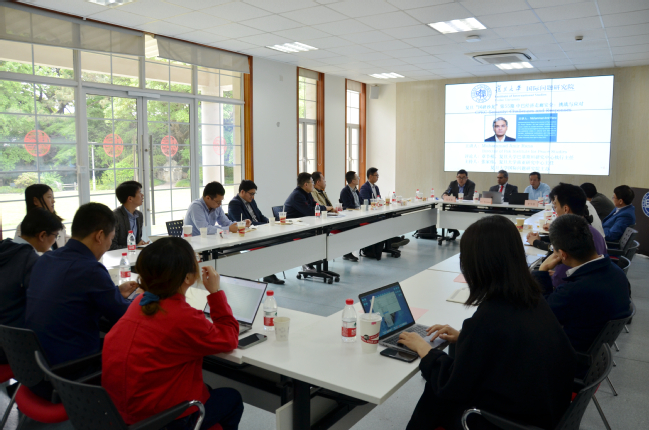On May 11, 2023, the 55th Youth Academic Workshop on International Studies of Fudan University (YAWIS Fudan) was held at the Center for Japanese Studies by the Institute of International Studies of Fudan University (IIS Fudan). Visiting Scholar Muhammad Amir Rana presented his research titled “CPEC Security: Challenges and Responses.” The 55th YAWIS Fudan was moderated by Professor ZHANG Jiadong, Director of Center for South Asian Studies of Fudan University (CSAS Fudan), and commented on by Associate Professor ZHANG Jiegen from Pakistan Study Centre of Fudan University (PSC Fudan). More than 30 faculties (mainly from IIS Fudan)and students from Fudan Universities attended the workshop.

Mr. Rana highlighted that the China–Pakistan Economic Corridor (CPEC) project is a significant component of Belt and Road Initiative (BRI) in Pakistan. He also assessed the progress and obstacles faced by the project during the last ten years.
Mr. Rana stated that the CPEC project significantly impacts Pakistan’s counterterrorism approaches. The initiative helped the government, including economic growth and military advancement. It enabled them to leverage their strengths in handling conventional security challenges to tackle emerging issues like counterterrorism more effectively. However, Pakistan faces geopolitical compulsions such as the Indian factor and its dependence on Western military hardware, which hindered the successful execution of the CPEC project in the country.
The scholar from Pakistan asserted that Pakistan’s distinct political issues and the attitude of the power elites also caused problems in achieving the targets of the CPEC-related projects. The country has not fully understood the significance of the narratives required for such a transnational mega initiative, nor has it adequately countered the adverse effects caused by Western and Indian propaganda. Additionally, the prevailing mindset among elites and the middle class is heavily influenced by the West is a factor of mistrust between the two people of two countries.
Mr. Rana identifies Extremism and the narrow vision of Pakistan’s elite as significant challenges for Pakistan and the CPEC. The superiority syndrome and narrow worldview compound these issues. Extremism poses a threat not only to Pakistan but as well to the CPEC.
Despite these challenges, Mr. Rana remains optimistic about resolving the issues and promising the implementation of CPEC. He believes deepening multi-level exchanges between China and Pakistan will further strengthen our relationship. This will be achieved through mutually beneficial economic cooperation resulting in a brighter future.

In the commentary section, Assoc. Prof. ZHANG Jiegen extended discussions with Mr. Rana on two aspects: differences in mutual perception between China and Pakistan and transnational cooperation on counterterrorism issues.

Professor WEI Zongyou, Associate Research Fellow YAN Shaohua, Assistant Professor WEN Yao at IIS Fudan, along with Chinese and international students also provided insightful comments and enriched the discussion. Prof. ZHANG Jiadong made concluded remarks and hoped that the challenges related to CPEC security would be addressed effectively through effective cooperation between China and Pakistan.






